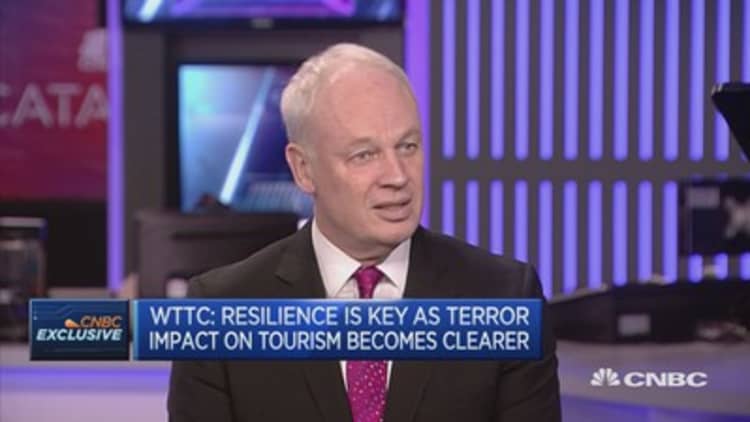
The U.S. business and leisure travel sector continued to perform well in 2016, however a global tourism and travel body's latest report suggests inbound travel looks less certain going forward, as U.S. dollar strength and anti-foreign sentiment is thought to dampen growth figures.
On Monday, the World Travel & Tourism Council (WTTC) released its annual Economic Impact Research report for 2017. In its U.S. report, the WTTC showed that the country's travel and tourism sector provided $1.5 trillion to the economy in 2016 and supported more than 14 million jobs.
However for 2017, the WTTC forecasts growth in the country's travel and tourism sector to come in at 2.3 percent, slower than 2016's rate of 2.8 percent.
The WTTC revealed that a key contributor to this deceleration was to do with what was going on domestically, however President Donald Trump's policies on immigration and travel could also have an effect on the sector.
"The U.S. overall is still 20 percent of the travel and tourism industry – so it is huge and we see a certain slowing this year," David Scowsill, CEO and president of the World Travel & Tourism Council (WTTC), told CNBC Monday.
"Less to do with the Trump-proposed travel ban, but more to what's going on domestically, with inflation, with disposable income going down a little bit – so that's the big impact."
"Inbound to the U.S., it's the strength of the dollar, so it's much more expensive for people to go this year – so you'll see some effect of that, and the Trump ban is not helpful," Scowsill added.

In March, Trump signed a revised executive order, temporarily banning the entry of travelers from six predominantly Muslim countries - Sudan, Syria, Iran, Libya, Somalia and Yemen – which the President saw as posing a high terrorism threat. The new proposed ban has however faced challenges and opposition from more than one federal judge in the U.S.
The order came just over a month after Trump signed the initial executive order that temporarily blocked entry for people from seven Muslim-majority nations – a move which was met with uproar from both inside the U.S. and overseas.
"(The ban has) sent out a clear message to the world that the U.S. is actually closing, it's not open for business and it's not just the six countries that were targeted – it's actually showing in the advanced bookings around the whole world," Scowsill said.
"So I think this ban is misguided. The six countries targeted – not one national of any of those countries has committed an atrocity on U.S. soil in the last 40 years, so this is not really a security issue, and the message that it sent round is that the U.S. is closing for business. It's not welcoming anymore, and that's a really difficult message."
In a release published alongside the tourism report, the WTTC said for the U.S. to continue to grow, it was essential to address the current projected fall in inbound travel and reverse any harmful views that have been created by travel ban talk.
"The good thing about President Trump – he does come from our industry, he knows about job creation in our industry and he knows where American jobs are. We're a very, very important employer of people in the United States; but this ban is misguided," said Scowsill.
"Once we get past this travel ban period – it'll either get put in or it'll get withdrawn we hope – then things will go back to normal and consumers will then look at the U.S. as a great place to visit again, for business and for leisure travel."


